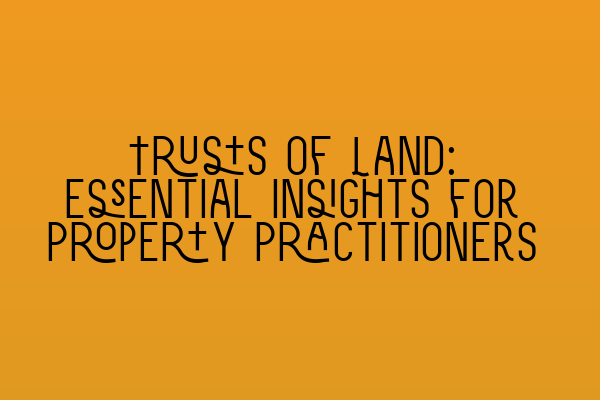**Trusts of Land: Essential Insights for Property Practitioners**
Are you a property practitioner looking to expand your knowledge on trusts of land? Look no further! In this blog post, we will provide you with essential insights into trusts of land that will help you navigate the intricacies of property law. Whether you are a solicitor, conveyancer, or a legal professional, these insights are vital for your practice. So, grab a cup of coffee, settle in, and let’s dive into the world of trusts of land!
Before we proceed, it’s important to note that trusts of land may seem complex, but with a solid understanding of the underlying principles and legal provisions, you will be well-equipped to handle any trust-related matters that come your way. Trusts of land are governed by the Trusts of Land and Appointment of Trustees Act 1996 (TOLATA), which lays down the framework for the creation, administration, and termination of trusts involving land.
**What is a Trust of Land?**
A trust of land, as defined by TOLATA, is any arrangement where land is held by trustees for the benefit of beneficiaries. The trustees have the legal ownership of the land, while the beneficiaries have the equitable interest. This arrangement ensures that the land is managed and utilized in the best interest of all parties involved.
**Types of Trusts of Land**
There are two main types of trusts of land: express trusts and resulting or constructive trusts.
1. **Express Trusts**: Express trusts of land are created when the settlor expressly declares their intention to create a trust by way of a written document, such as a trust deed or a will. These trusts are often established for the benefit of family members, allowing them to benefit from the property while preserving its assets for future generations. It is essential to dot all the i’s and cross all the t’s when drafting the trust documentation to avoid ambiguity or potential disputes down the line.
2. **Resulting or Constructive Trusts**: Resulting or constructive trusts of land arise by operation of law, rather than through the express intention of the parties. These trusts come into play when property is acquired or held in circumstances that give rise to a trust, even if no formal declaration of trust exists. Resulting trusts often arise in joint ownership situations, where one party claims a beneficial interest in the property, which may not be reflected in the legal title. Constructive trusts, on the other hand, are imposed by the court to prevent unjust enrichment.
**Key Elements and Considerations**
When dealing with trusts of land, there are several key elements and considerations to be mindful of:
1. **Legal Ownership vs. Equitable Interest**: As mentioned earlier, trusts of land involve a distinction between legal ownership and equitable interest. This distinction is crucial to understand, as it determines the rights and responsibilities of the trustees and beneficiaries. The legal owners hold the property on behalf of the beneficiaries and are bound by fiduciary duties to act in the beneficiaries’ best interests.
2. **Beneficial Interests**: Beneficial interests can take various forms, such as a fixed interest, a discretionary interest, or a contingent interest. These interests dictate the rights and entitlements of the beneficiaries. It is crucial to establish the beneficiaries’ interests clearly to avoid any confusion or disputes in the future.
3. **Trustees’ Powers and Duties**: Trustees play a pivotal role in the management and administration of trusts of land. They have a duty to act in the best interests of the beneficiaries and fulfill their fiduciary obligations. Understanding the extent of trustees’ powers and their duties is vital to ensure the proper administration and protection of the trust property.
4. **Disputes and Resolutions**: Trusts of land can often give rise to disputes among beneficiaries or between beneficiaries and trustees. It is essential to be prepared for such situations and have mechanisms in place to resolve these disputes effectively. Alternative dispute resolution methods, such as mediation or negotiation, can be employed to reach a mutually agreeable resolution.
**Conclusion**
Trusts of land form an integral part of property law, and as a property practitioner, it is essential to have a solid understanding of the principles and provisions governing trusts of land. The insights provided in this blog post aim to equip you with the necessary knowledge to navigate the complexities surrounding trusts of land.
If you are preparing for the SQE exams, be sure to check out the **SQE 1 Practice Exam Questions** and **SQE 1 Practice Mocks FLK1 FLK2** articles on our website for valuable resources to enhance your preparation.
At SQE Property Law & Land Law, we offer comprehensive and tailored **SQE 1 and SQE 2 preparation courses** designed to help you excel in your exams and succeed in your legal career. Stay tuned to our website for updated **SRA SQE Exam Dates** to help you plan your studies effectively.
Remember, trusts of land may seem intricate, but with the right knowledge and expertise, you can confidently navigate the complexities and provide effective legal solutions to your clients. Stay committed to continuous learning and stay ahead of the game!
*Don’t hesitate to reach out to us at SQE Property Law & Land Law if you have any questions or require further assistance. Our team of experienced professionals is here to support you on your journey towards becoming a successful property practitioner.*
